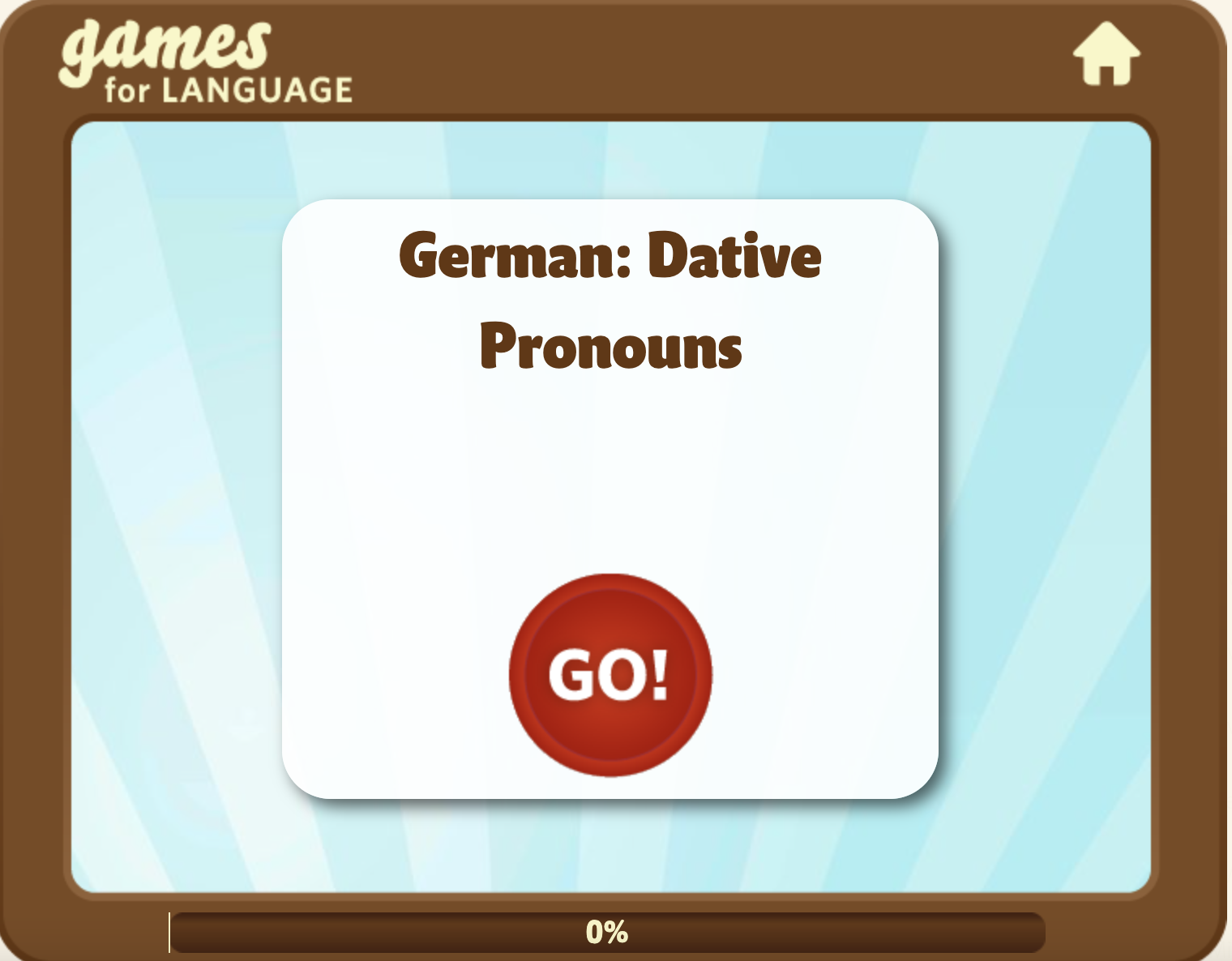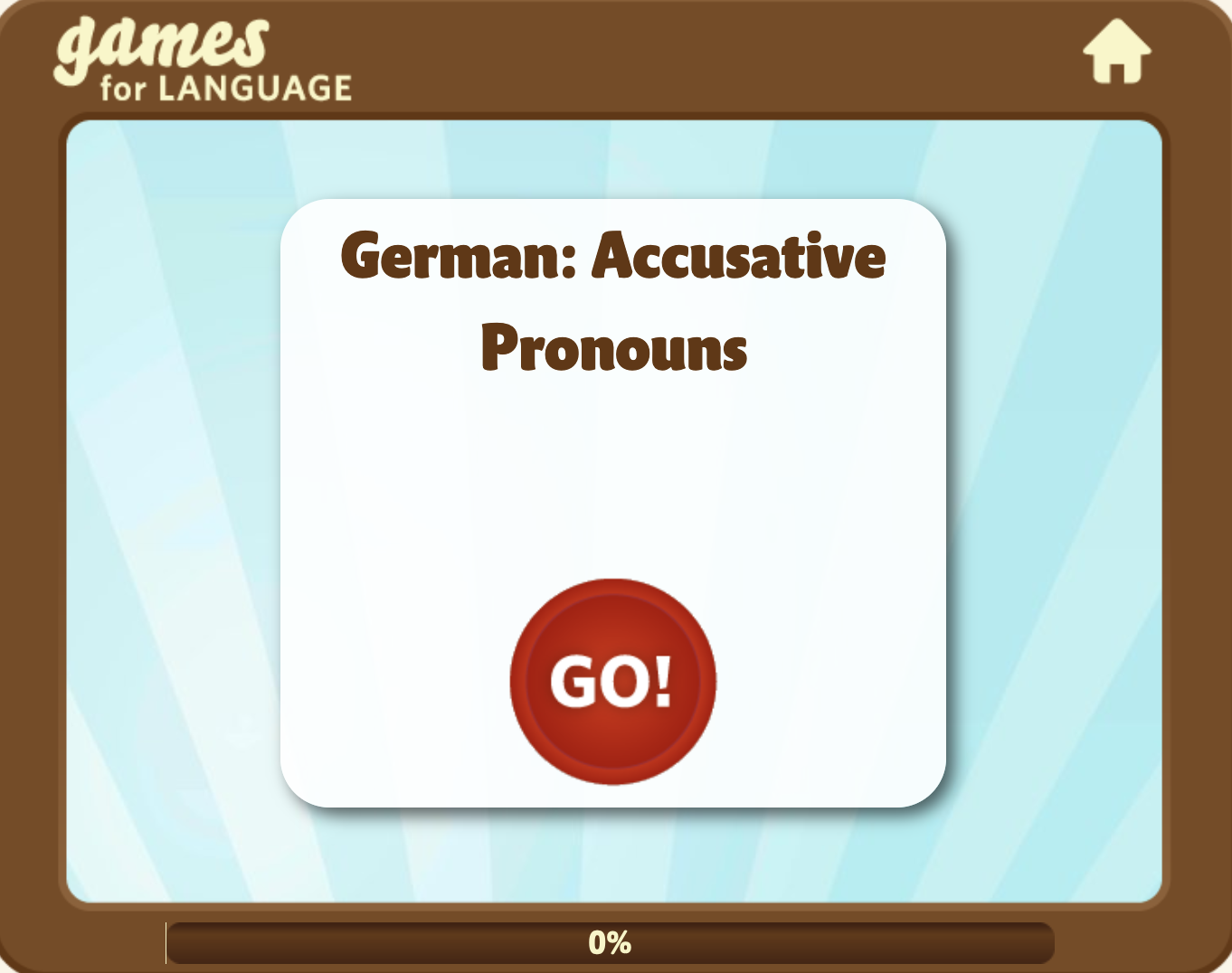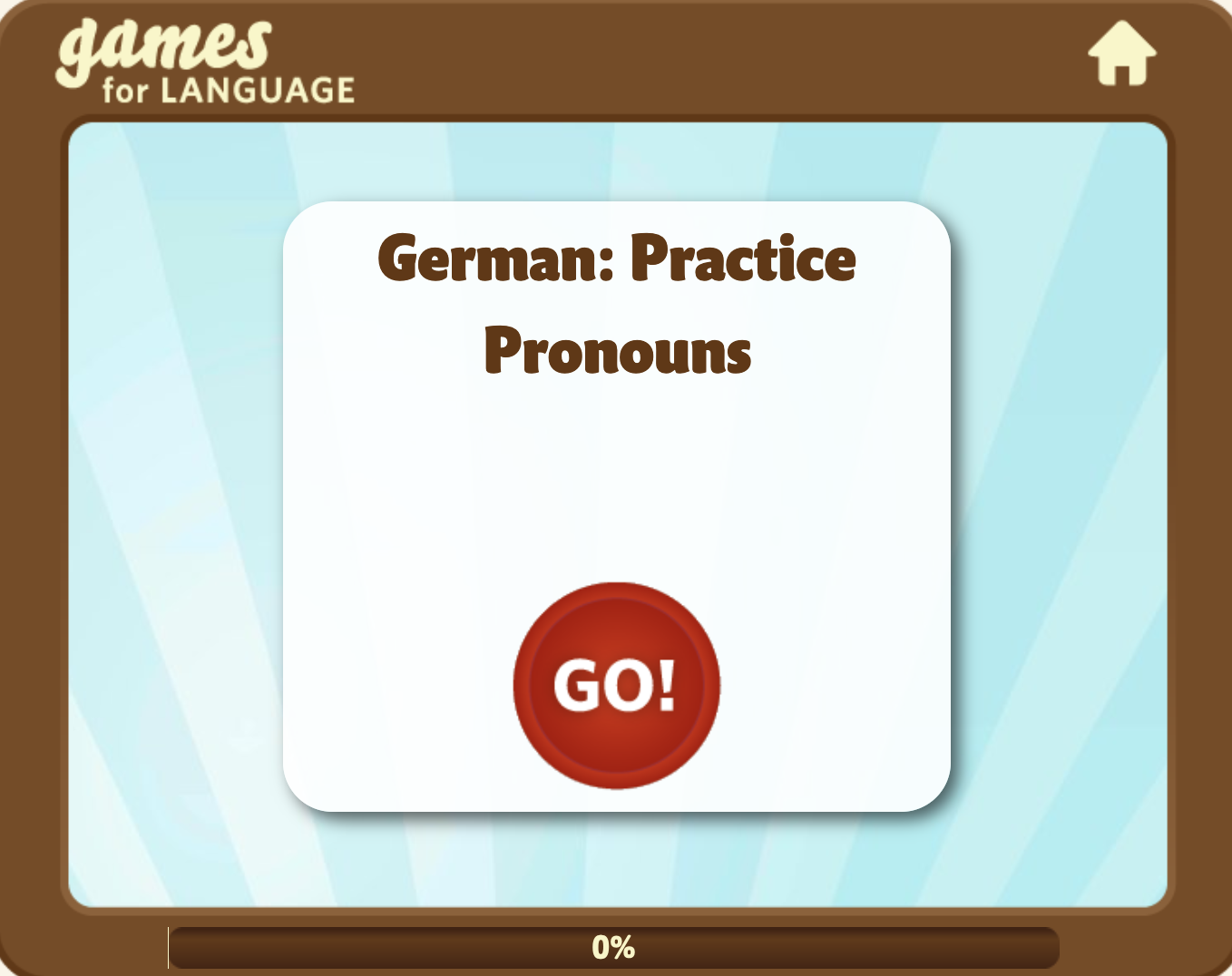German Dative and Accusative Pronouns With Easy Games
![]() Do the German Accusative pronouns and Dative pronouns give you a little headache from time to time? Do you automatically know when to use use the dative or accusative form?
Do the German Accusative pronouns and Dative pronouns give you a little headache from time to time? Do you automatically know when to use use the dative or accusative form?
It not, you're not alone. But there's a way to tackle the dative and accusative forms step by step. Here you can start with the German dative pronouns.
The "dative" forms, also known as "indirect objects" are nouns or pronouns that tell you for whom or to whom an action is done.
For example:
You gave my number to him!?
Oh no, you gave her my book?
She showed me her apartment.
In English, the pronouns for the indirect object (dative) and the direct object (accusative) are the same: me, you, him, her, us, them.
However, German has different forms for the dative (indirect) and the accusative (direct) pronouns. The two exceptions are "uns" (us / to us) and "euch" (you-all / to you-all).
German Dative and Accusative Pronouns
Dat: mir - (to) me
Acc : mich - me
Dat: dir - (to) you, familiar
Acc: dich - you, familiar
Dat: ihm - (to) him
Acc: ihn - him
Dat: ihr - (to) her
Acc: sie - her
Dat: Ihnen - (to) you, formal
Acc: Sie - you, formal
Dat: uns - (to) us
Acc: uns - us
Dat: euch - (to) you-all
Acc: euch - you-all
Dat: ihnen - (to) them
Acc: sie - them
So, how to navigate this grammatical jungle?
Start by becoming familiar with the forms. A good way to do that is by practicing some simple sentences that will help you to get the words and the sounds into your brain.
Geben, zeigen
The verbs "geben" (to give) and "zeigen" (to show) are very useful for learning dative pronoun forms.
It's pretty clear that one gives "something" (direct object /accusative case), "to someone" (indirect object /dative case).
And, that one shows "something" (direct object /accusative case), "to someone" (indirect object /dative case).
Sehen, kennen, suchen, anrufen
The verbs "sehen" (to see), "kennen" (to know, be acquainted with), "suchen" (to look for), and "anrufen" (to call, i.e. phone) clearly take a direct object (i.e. the accusative pronoun).
To help you make these forms intuitive, we've put together some games. One for Dative pronouns, one for Accusative pronouns, and a third one where you choose between Dative and Accusative.
 The Dative Pronouns Game
The Dative Pronouns Game
In the Dative Pronouns Game, you'll first review the dative pronouns and some vocabulary. You'll then put basic sentences together. To ace the Dative Game, you may want to play it a couple of times.
Ich gebe ihm den Schlüssel. (I'm giving him the key.)
Kann ich Ihnen meine Handynummer geben? (Can I give you my cell number? [formal])
Geben Sie uns doch Ihre Adresse. (Do give us your address.)
Warum gibst du mir das Buch? (Why are you giving me the book?)
Sie zeigt ihnen die Zeitung. (She shows them the newspaper.)
Er zeigt dir den Stadplan. (He shows you the city map.) [familiar]
Wir zeigen ihr das Foto. (We're showing her the photo.)
Sie wollen euch die Wohnung zeigen. (They want to show you-all the apartment.)
 The Accusative Pronouns Game
The Accusative Pronouns Game
In the Accusative Pronouns Game, you first review the accusative pronouns. You'll then put together basic sentences using these pronouns and verbs that take a direct object.
Er sieht dich. (He sees you. [familiar])
Wir sehen Sie. (We see you. [formal])
Ihr seht ihn. (You-all see him.)
Du kennst ihn. (You know him.)
Ihr kennt sie. (You know her /them.)
Kenne ich Sie nicht? (Don't I know you? [formal])
Ich suche sie. (I'm looking for her /them.)
Er sucht euch. (He's looking for you-all.)
Wir suchen sie. (We're looking for her /them.)
Du rufst mich nie an. (You never call me.)
Ich rufe dich später an. (I'll call you later. [familiar])
 The Practice Pronouns Game
The Practice Pronouns Game
If you have navigated the previous two games successfully, the Practice Pronouns Game will be your next challenge.
Here we have Accusative and Dative forms mixed up and you'll also have to choose again between the familiar and formal forms.
Dative Prepositions
Some German prepositions always take the dative case. Here are 5 common ones:
bei, mit, nach, von, zu
Examples:
bei (near, next, at, with)
Sie wohnt jetzt bei mir (She now lives with me /at my place.)
mit (with, together with)
Ich gehe gern mit dir ins Kino. (I like going to movies with you.)
nach (after, to [direction])
Bitte, nach Ihnen. (Please, after you. Go ahead.)
von (from)
Ich habe heute einen Brief von ihm bekommen. (I got a letter from him today.)
zu (to [direction])
Gehst du heute zu ihr? (Are you going to her place today?)
Dual Prepositions
You thought that you have figured out now whether to use the accusative or dative form of the pronouns?
But I have bad news: There are also a number of common German prepositions that take either the dative or the accusative case. Generally speaking, the difference is one of "static position" (with the dative), "change of position" (with the accusative).
an (on, at)
auf (on, on top of)
hinter (behind)
in (in, into)
neben (beside)
über (over, above)
unter (under, below)
vor (in front of, before)
zwischen. (between)
These prepositions are best explained with examples using a noun rather than a pronoun.
We'll do this in another blog post.
Bio: Ulrike Rettig is the co-founder of GamesforLanguage.com. She's a lifelong language learner, growing up in Austria, the Netherlands, and Canada. You can follow her on Facebook, Twitter and Instagram, and leave any comments right here!
